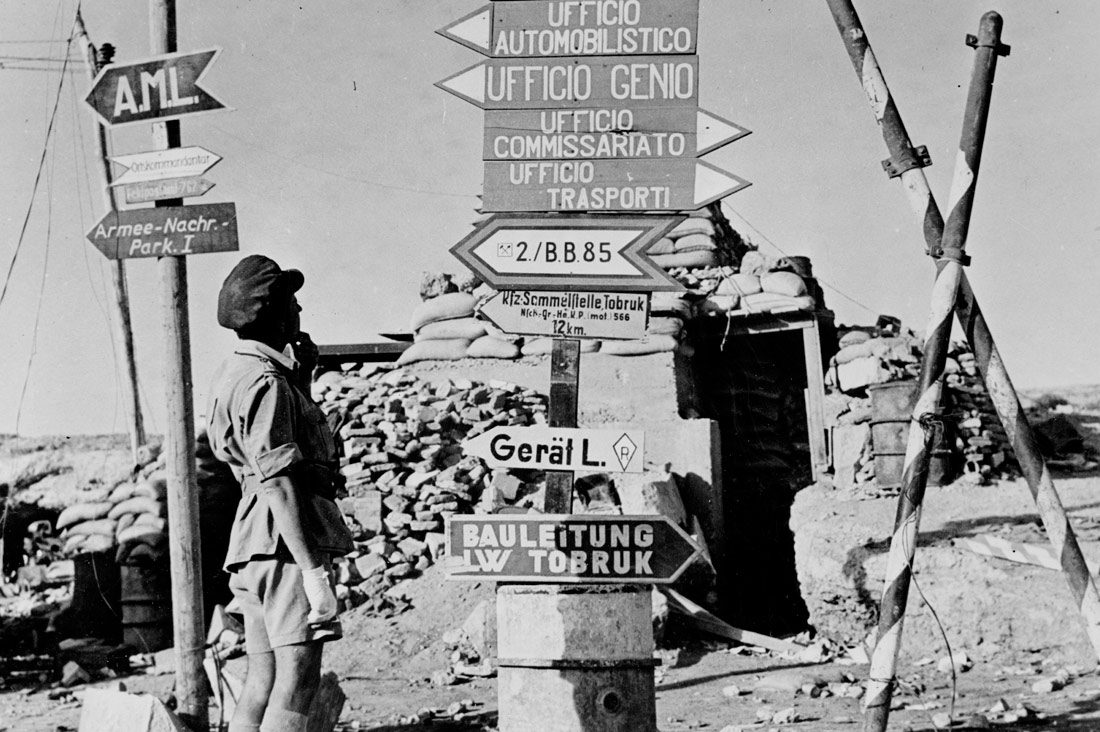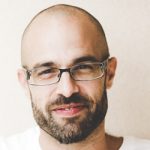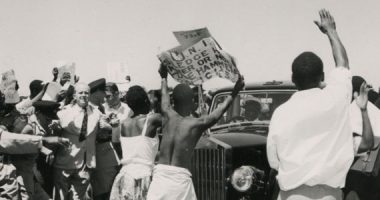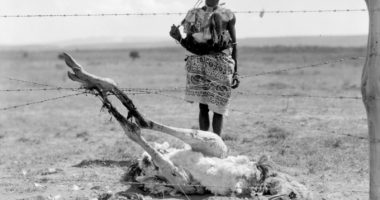
Signposts printed in German and Italian point to former Axis offices at a street corner. Tobruk, Libya, 1942 | Library of Congress | Public Domain
Access to the Internet is advancing at a dizzying pace in Africa. User numbers have doubled in just five years. But hand in hand with this rapid expansion, and taking advantage of a lack of experience, also expanding is the fake news phenomenon. Africans feel more exposed to this manipulated information than Americans and for this reason, civil society has mobilised. They are trying to stem the tide of lies and hate speech that often accompanies fake news, to preserve the neutrality of the Internet and, above all, to neutralise one of the main excuses for imposing censorship being used by certain governments with anti-democratic agendas.
In Gwere, one of the national languages of Uganda, lugambo is the word used to refer to gossip, and for the country’s president Yoweri Museveni, that is the main activity of the social media networks. During the first half of 2018, the president launched a crusade against non-important conversations, scams, rumours and chat online. Lugambo was the reason argued to slap a tax on the use of social media networks. For defenders of the freedom of expression, it was, in reality, an excuse to hinder access to digital tools that insisted on contradicting Museveni. In truth, his relationship with Internet communities has been complicated for years. In 2016, he had no qualms about blocking them during the presidential elections, about recognising that he had done so, or about justifying it as “a security measure to avoid lies that would incite violence”. But the fact is that, in addition, he had done the same thing five years previously, for the 2011 elections.
Museveni is not the only one adopting radical measures in favour of security and deciding that the best way of avoiding the dissemination of fake news is by preventing access to the Internet. In fact, beyond those who are looking after number one, on the African continent there is a growing concern regarding the spread of hoaxes and rumours through digital media. There are still not many investigations in this area, but one of the few studies that exist points out that Africans are more exposed to fake news than Americans. At least, that is how the people involved see it themselves. A preliminary study of academics at the universities of Cape Town and Houston pointed out that Kenyan, Nigerian, and South African users had a greater feeling of exposure to fake news than that expressed by US users in a previous study produced by the Pew Research Center.
At this stage, fake news items that take advantage of the digital environment to grow and spread are common, but the most worrying aspect is their consequences. The Cambridge Analytica scandal exposed the company’s participation in the electoral campaigns of Nigeria in 2015 and of Kenia in 2013 and 2017. Among the actions of this “data analysis company” was the manipulation of news. One repentant company employee recognised that in Nigeria they had produced and disseminated a video that painted one of the candidates as in favour of imposing the sharia and indiscriminately resorting to violence. By chance, during the Kenyan campaign of 2017, a video cropped up with the same apocalyptic tone towards the supposed posture of one of the candidates.
An investigation by the BBC reveals that in June 2018, a series of fake news and explicit (but manipulated) photographs of extreme violence fanned the flames of confrontation between ethnic communities in Plateau State, in the centre of Nigeria. “Nigerian police say that fake news and incendiary images on Facebook have contributed to more than a dozen recent killings in Plateau State – an area already torn by ethnic violence”, the British medium affirms. The same investigation points out that these fake news reports found a distribution channel, above all, through Facebook, and that the social media network allocates insufficient resources to preventing fake news from circulating among its profiles in the African country.
The continent has already been the setting for the worst consequences of the manipulation of information. The so-called “hate media” played a fundamental role in the 1994 genocide in Rwanda. Long before the advent of social media networks and digital tools, Radiotélévision Libre des Mille Collines (RTLM) and the magazine Kangura took it upon themselves to stir up the atmosphere, disseminating fake news and demonising, criminalising and caricaturising a part of the population, to end up de-humanising it and calling for extermination, with well-known appeals to put an end to “the cockroaches”.
Concern with this growing role played by fake news in Africa is related with four elements. Firstly, the constant presence of mobile telephones, which now reach eight out of every ten inhabitants on the continent and represent the mass availability of instant communication channels. Moreover, the dizzying growth in access to the Internet has meant that in five years there has been a doubling of the number of users and of the Internet’s penetration. In other words, there are 250 million Africans with fewer than five years of experience using the Internet. Thirdly, the youthfulness of the continent that means that half of the population is aged below eighteen years and that the average age is nineteen years. And finally, the frequency with which political actors are trying to instrumentalise ethnic, religious and cultural issues.
However, African civil societies have not been passive observers of this global phenomenon; instead, they have mobilised to reduce the impact of fake news and hate speech through the networks. In the last seven years, the organisation AfricaCheck has consolidated its position as African leader in factchecking. Working in South Africa, Nigeria, Senegal and Kenya, the staff of this civil society organisation have managed to secure rectifications from major media and, above all, sew the seed of factchecking in national media arenas. PesaCheck is an example of this growing interest. It was created in 2016 and designed to focus on the budgets of the countries of Eastern Africa, fundamentally Kenya, Tanzania and Uganda. Despite this initial objective, it has ended up checking information around many more issues. Beyond consolidated platforms, spreading around the continent are more modest initiatives that, at least, show sensitivity.
In parallel, other civil society organisations are working to stem this dangerous flow of manipulated, false and malicious information. In especially critical situations, groups that are more familiarised with the digital environment are launching initiatives to alert about hoaxes that are circulating around the networks and to put a stop to them. The Central African Republic is the country with the fourth-lowest internet penetration in the world; only five out of every one hundred Central Africans have access to the Internet, but even so, an organisation of bloggers from the country launched an initiative a few months ago to prevent hate speech and fake news. One detail that may be interesting is that the Central African Republic appears on the list of the world’s most neglected humanitarian displacement crises published by the Norwegian Refugee Council and, in parallel, the parties involved in the conflict are immersed in peace talks that have raised high hopes. Bloggers do not want a rumour disseminated via the Internet to mess up this opportunity to put an end to the violence.
This concern and the global stir regarding the fake news phenomenon has been, in any case, the ideal pretext for governments that do not believe in the neutrality of the web. Those who previously blocked the Internet to silence protests and have avoided giving explanations or have referred to vague technical problems, today believe that they have an argument. The will to clamp down on fake news that will feed hatred and unleash violence serves as an excuse and is used, for example, when there is an attempt to prevent the spread of images of police violence or, even, when aiming to hamper a civil society from taking responsibility for its own political fate.
We saw it in the case of Uganda, with Yoweri Museveni extremely worried about the lies circulating around the social media networks — this, by the way, after thirty-three uninterrupted years in power and his experience as the third most veteran president in Africa. But the argument was the same as that used in the Democratic Republic of the Congo, for a shutdown of the Internet following elections that were held two years late and in an extremely tense climate of suspicion of fraud.
But the threat of lies is not only used to justify shutdowns, but all kinds of control measures. In mid-2018, the government of Tanzania set up a whole battery of measures including an annual charge of over 900 dollars for bloggers to get a license, which the government can revoke in cases of publication of content that “causes annoyance, threatens harm or evil, encourages or incites crimes” or that jeopardises “national security or public health and safety”. At the start of this year, the Minister of Information of Zimbabwe announced work to draw up a package of laws on the digital environment, from regulation of e-commerce to the fight against cybercrime. She said that the aim was to ensure that “Internet and related technologies are used for the good of society, not to violate national security”.
In all the cases described above, organisations defending digital rights and freedom of expression have been the first to launch citizens’ initiatives to stem hate speech and fake news, but they have also been the first to alert to the anti-democratic nature of the measures announced by the authorities using the alibi of defending the truth.





Leave a comment